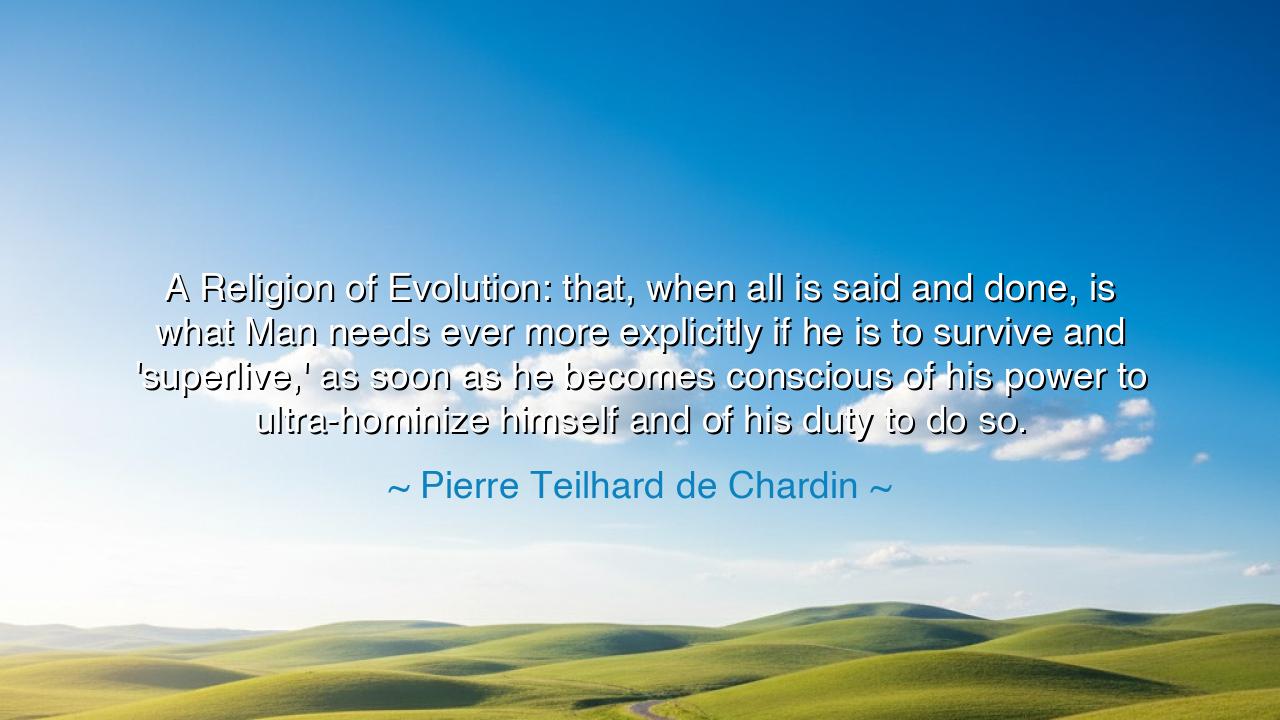
A Religion of Evolution: that, when all is said and done, is what
A Religion of Evolution: that, when all is said and done, is what Man needs ever more explicitly if he is to survive and 'superlive,' as soon as he becomes conscious of his power to ultra-hominize himself and of his duty to do so.






"A Religion of Evolution: that, when all is said and done, is what Man needs ever more explicitly if he is to survive and 'superlive,' as soon as he becomes conscious of his power to ultra-hominize himself and of his duty to do so." These powerful words by Pierre Teilhard de Chardin resonate like a clarion call to the deepest recesses of our being. Teilhard, a visionary and philosopher, offers us a profound view of human evolution—not just as a physical process but as a spiritual and moral imperative. In this age-old pursuit, the path of evolution becomes not merely a biological journey but one of higher consciousness and divine purpose. It is not enough for humanity to merely survive; we are called to ultra-hominize—to transcend our current nature, to evolve into something greater than ourselves.
The quote speaks of a religion of evolution, which is to say that the very process of becoming—of evolving—is sacred. This is not the evolution of our bodies alone, but of our minds, our spirits, and our societies. In our pursuit of progress, we must not forget the call to higher consciousness. This religion of evolution implies a duty, a sacred obligation, to continue the path of self-improvement, not only for personal gain but for the survival and flourishing of all. Teilhard's words suggest that we must cultivate the awareness that our future is shaped by our ability to evolve consciously, to actively participate in the process of growth.
Consider the greatest thinkers in human history—Socrates, Aristotle, Descartes—whose insights shaped the course of civilization. These philosophers recognized that the mind and spirit could evolve. They pushed humanity toward greater understanding, greater reason, and greater virtue. In their pursuit, they faced immense struggles, for the evolution of thought is not a smooth path. Yet their work gave rise to entire systems of belief that would define the very soul of civilization for centuries to come. Teilhard, in his vision, urges us to take this pursuit one step further, to not just seek intellectual growth but spiritual evolution. The ultimate purpose is not merely survival but the transformation of the human soul into something greater.
But this path is not without its challenges. Humanity stands at a crossroads. As we reach new scientific heights, new technological advancements, and push the boundaries of space and knowledge, we must also evolve morally. The mere acquisition of power, be it through technology or knowledge, is not enough. Teilhard warns that, without conscious evolution, we risk losing our humanity in the face of progress. In this age of artificial intelligence, we are witnessing the increasing tension between the mechanical and the human. The rise of technology, though it promises great benefits, must be tempered with a deep awareness of its potential to alter our moral fabric. We are called to ensure that our evolution does not just create a new world but a better world—one where human dignity, compassion, and justice guide our actions.
Reflect on the example of Mahatma Gandhi, a man who sought to evolve humanity through nonviolence, truth, and spirituality. Gandhi's journey was not one of outward conquest but of inward transformation, a journey to harness the power of the spirit to bring about change. He understood that humanity's true strength lay not in conquering the world but in evolving our hearts to reflect a greater truth. His life serves as a beacon for Teilhard’s vision of the religion of evolution—where the path forward is a path of conscious growth, a path that aligns the soul with the universe.
So, what is the lesson to take from Teilhard's words? It is a call to evolution—a call to recognize that survival alone is not enough. We are not merely products of chance or circumstance; we are custodians of the future, guardians of our destiny. Our duty, as Teilhard so poignantly expresses, is to evolve—not only physically but morally and spiritually. We must not shy away from the challenges of our time. In the face of adversity, we must seek higher ground—to evolve into beings that are greater, wiser, and more compassionate than we have ever been.
Thus, we are called to embrace this evolutionary religion. It is a religion of purpose—the purpose of continuous growth, continuous learning, and continuous transformation. As we evolve, we must ensure that we do so with consciousness and compassion, for the future of humanity depends not only on our minds but on our hearts. The challenge is before us, and the journey must be taken, no matter how difficult the road may seem. Let us step forward with awareness, with hope, and with the firm belief that the best version of humanity is yet to come.






AAdministratorAdministrator
Welcome, honored guests. Please leave a comment, we will respond soon